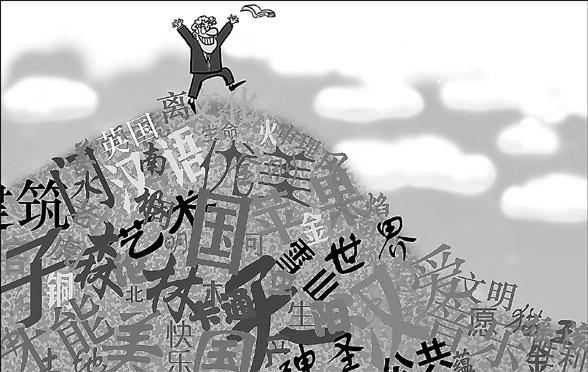Scaling the summit

GUANGZHOU: About 5,500 full-time foreign students and 1,000 expats in Guangzhou are busy studying Chinese at private language centers in a bid to speak like a local. Meanwhile there is a small batch of foreigners who make all these beginners green with envy. They are frequently called "Guangzhou's Dashan (China's famous Chinese-speaking foreigner)" because of their high level.
Three such people tell different stories about how they achieved their dream, and their stories are different. However, they all share similar traits - a lengthy time in China, passion to persevere and willingness to immerse themselves deep into Chinese society.
Kerry Burton has lived here for the better part of 25 years and remembers his first trip in 1980 as a mixed blessing.
"I was only 12 years old and China was just starting to open up. Everything looked so strange. Undeveloped. Being so young, I just hated the idea of coming here," he says. "We were put in a school with local Chinese students and my brother and I just sat there for a week till they kicked us out.
"Then someone came up with the idea of teaching us Chinese from the very beginning with the first graders. And that's how I started."
Today, the business development director for New Mandarin Concept, draws on his Chinese studies and 10 years' translating for foreign companies. He travels to major cities giving presentations, drumming up business and conversing with local staff - all in Chinese.
Most unusual was his appearance on popular drama Su Qi'er, on which he played an atypical foreign villain and the love rival of hero, actor Huang Rihua. "Basically I got beaten up for three episodes," he laughs. "I was a friend of one of the actresses on the show and one day we bumped into the show's director who was so impressed with my Chinese, he asked me to be in it.
"I think I've gotten as good as I have because of all the Chinese friends I have."
American Paul Condrell has lived here for the past 20 years but first came to China in 1983, and studied the language for two years. At Beijing Normal University he met his future wife and business partner, and his life took a new direction.
"I was inspired by an older student who spoke Chinese really well. I noticed he was modulating his voice as Chinese do and this made me want to be as good," he says.
After returning to the United States and graduating in law, he came back in 1987 and began working as a marketing consultant for foreign brands looking to break into the local market.
Today, Condrell runs a thriving mail-order business, Xiaokang (Healthy Household), which carries products from about 2,000 companies and employs a staff of 180. He has also given lectures, in Chinese, in strategic marketing for South China University of Technology's MBA program.
Condrell speaks Chinese so fluently that he is often mistaken for a local on the telephone.
Planned for release next year, his Mastering Mandarin Tones: You can. You Will, aims to give foreigners, particularly Westerners, the skills to handle this art, and dispel a few myths. "The most important thing of all is to have confidence," he says. "Fear of speaking, of making a mistake, will only slow you down. If you really have the will to learn Chinese, you will do it."
A fascination with Chinese philosophy and classical Chinese texts, including Tang Dynasty poems and the ancient writings of Lao Tze, motivated Brenda Hood to reach a depth of Chinese literature knowledge that even confounds locals. The Canadian first studied in Taiwan for four years after arriving in 1989. She then moved to the mainland, where she taught English while studying traditional Chinese medicine (TCM).
" I'm completing my PhD in Chinese medicine. I have one more year of medical practice and then I'll be able to sit for the doctor's examinations and be able to practice," she says.
Studying such a specialized field was a double challenge for Hood. Because she was forced to use more difficult traditional Chinese characters, "there was this pressure of trying to this complex topic while coming to grips with the Chinese at the same time," she says. "You are really forced to sink or swim."
But she has succeed, not only in her studies but also in becoming something of an armchair expert on ancient Chinese texts. She can read works on Taoism and philosophy, some stretching back more than 1,000 years ago or more. She has also been a guest on TV talk show Zhong Hua Yi Xue (Chinese Medicine), on which she was the only foreign panelist. She also has ongoing university engagements speaking on Chinese philosophy, Taoism and Chinese alchemy to Chinese students.
"My advice to foreign learners is to find something in China that interests them beyond the Chinese (language)," she says. "For me, the interaction of reading Chinese for my studies helped improve my skills."
(China Daily 10/25/2007 page20)














